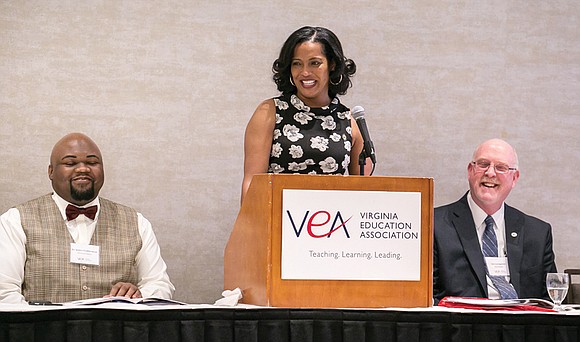Minority teachers, students facing same challenges of Jim Crow South
2/24/2017, 12:54 p.m.

By Holly Rodriguez
Unequal pay for teachers of color, poor quality education for African-American students, neglecting African-American history in school curricula and political activism as a means to improve education were among the major issues for African-Americans prior to the landmark 1954 U.S. Supreme Court case, Brown v. Board of Education.
More than six decades later, educators and administrators of color at the first Teachers of Color Summit held last week in Downtown explored solutions to the same problems and barriers to progress that plagued African-Americans in the Jim Crow South.
Coalition building is key to addressing the problems, said state Sen. Jennifer McClellan of Richmond, who was part of a panel and discussion last Saturday at the three-day event.
She noted the top three issues in education today are “teacher recruitment and retention; the impact of the school-to-prison pipeline on a child’s education, development and growth; and resources, from repairing our buildings to funding programs for teachers to enhance their classrooms.”
“The advice I have for our community is this,” she said. “You have to advocate for your school, be a part of coalition building between businesses in the community, parents, teachers and administrators.”
She said this can be achieved by starting at the local level, working with the school board, city council and state government officials and working in a way to demand their attention.
“Talking to policymakers, inviting them into the school’s classrooms to see what the environment is, what challenges our students and teachers face — this will contribute to change.”
Hundreds of educators, policymakers and community representatives from the mid-Atlantic states and Ohio participated in the event that was sponsored by the Virginia Education Association and the Virginia Department of Education. It is part of a yearlong commemoration of the 50th anniversary of the merger of the Virginia Teachers Association and the Virginia Education Association. The VTA was established in 1887 by African-American educators, while the VEA, established during the Civil War, had a history of being only for white educators.
Jahana Hayes, a high school history teacher in Waterbury, Conn., and the 2016 National Teacher of the Year, gave the keynote address at the Friday morning session.
During a breakout session focused on education policy and quality of life for teachers, the discussion began with the need for better compensation for teachers before quickly turning to the need for educators to be on the front lines of politics.
“Teachers need to run for public office,” said Sam Eure, a geography and history teacher at York High School in Virginia’s York County.
“I realized that if I really wanted to make a difference, if I really wanted to help others make a difference, I would have to run for office.”
Mr. Eure is the president of the York Education Association.
He encouraged teachers to tap into existing political resources, and even knock on doors, to keep the needs of public education in the public spotlight.
“We’ve got to keep Virginia blue if we want to improve public education,” he said. “If we go the way of Betsy DeVos (the new U.S. secretary of education), our schools will go back to being just for the wealthy again, and our kids will be denied access to any kind of opportunity.”
Thea Paul, media specialist for Westover Hills Elementary School in Richmond and a teacher in public and private schools for 24 years, said she understands politics is important, but that being visible and making sure African-American students know and understand their history is essential for propelling students forward.
“I feel compelled to leave a legacy of learning, especially for people of color,” she said. “But it is important for all students to see that African-American teachers are capable, we are organized, we can communicate. Learning African-American history and seeing us in the schools helps the growth and development of all our students.”
One new problem facing teachers and students is the Standards of Learning tests that dominate public school curricula in Virginia and elsewhere.
“We need to teach, not test,” one teacher from Alexandria said. “Our kids are losing the ability to be creative, and it’s a shame what we are doing to them.”






